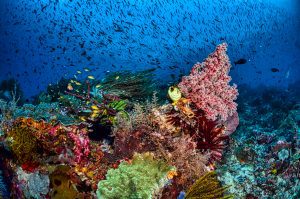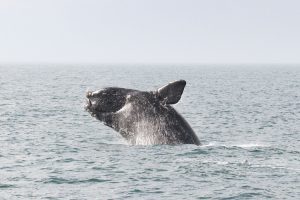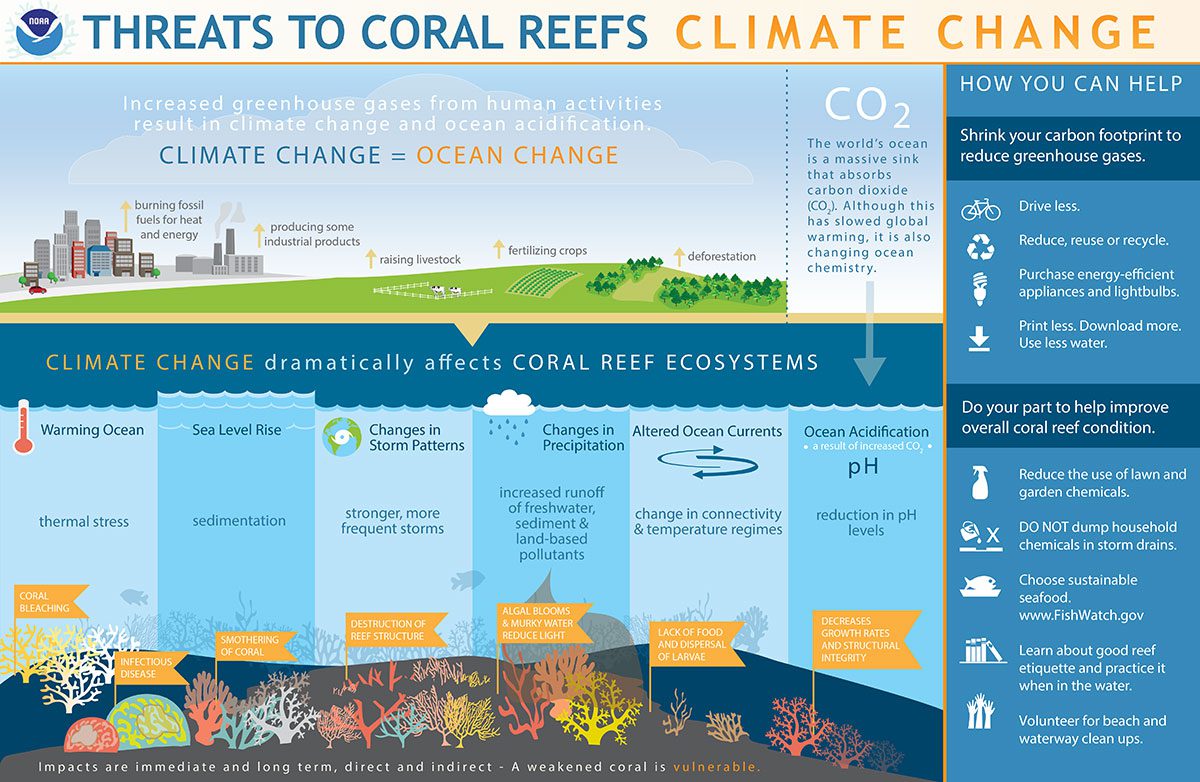As discussed in our last blog post, climate change is the biggest threat to coral reefs.
Coral Reefs And Climate Change
Rising temperatures lead to mass coral bleaching events, as warmer temperatures cause corals to go into thermal stress. While bleached or in thermal stress, corals are more susceptible to infectious disease, which can lead to more frequent outbreaks. Also, the increased amount of CO2 being absorbed by the ocean has led to ocean acidification, diminishing calcification rates in reefs. This causes coral growth and structural integrity to be stunted.
Climate change has also led to an increased frequency and intensity of tropical storms, which when combined with the other effects has a dramatic impact on coral reefs and the ecosystem’s ability to function. The combination of these impacts is expected to eliminate most if not all warm water reefs by the year 2050. Cold water reefs will also be similarly impacted though to a lesser degree.
Coral Reefs Adapting to Climate Change
 Coral reefs are known for their biodiversity and are home to a plethora of marine animals that rely on them for food, shelter, nurseries, and breeding grounds. These animals include clownfish, grunts, damselfish, parrotfish, surgeonfish, sea turtles, rays, reef sharks, eels, and so many more. Approximately half of all federally managed fisheries depend on coral reefs.
Coral reefs are known for their biodiversity and are home to a plethora of marine animals that rely on them for food, shelter, nurseries, and breeding grounds. These animals include clownfish, grunts, damselfish, parrotfish, surgeonfish, sea turtles, rays, reef sharks, eels, and so many more. Approximately half of all federally managed fisheries depend on coral reefs.
Coral reef adaptations help corals survive. However, warmer temperatures and other climate change-related impacts are forcing reef dwellers, and coral reefs themselves, to adapt very quickly to new conditions, and often, too quickly. Unfortunately, not all have the ability to do so.
Can Coral Reefs Adapt to Climate Change?
Some fish species with greater temperature tolerance will be able to migrate polewards to cooler waters, but those with little tolerance to cold water may simply die off altogether. For instance, speckled damselfish, yellow surgeon, and moon wrasse have very little tolerance for cold water, and therefore would struggle to relocate to cooler waters. Neon damselfish and sergeant majors, on the other hand, have a high tolerance for cold water and would be more likely to successfully relocate. This shifting of habitat due to changing water temperatures would have a huge impact on the biodiversity of coral reefs, as whole families of fish could be wiped-out.
Coral reef evolution is slow as they are quite long-lived; there is currently little evidence that they are able to keep up with rapidly warming ocean temperatures and/or migrate their way into cooler water. Warmer ocean temperatures are in general expected to cause a decrease in the quantity of marine plants. A study found that since 1950 the amount of phytoplankton in the surface waters of the ocean has declined by 40%, thus reducing the amount of food available for marine life. Less food availability means less marine life all around.
How Does Climate Change Affect Marine Life?
 Warmer oceans are also expected to cause life cycles of marine plants and animals to become out of sync as organisms either arrive too early or too late to find food. Organisms’ life cycles are typically tied to their environment, so even an incremental change in water temperatures can have a big impact on the patterns of different organisms. One example of this is the extremely endangered North Atlantic right whale, which has seen major changes in their migratory patterns even though their prey, zooplankton, has not been following the same pattern. The negative impact of this has been seen in the observance of unhealthy looking North Atlantic right whales.
Warmer oceans are also expected to cause life cycles of marine plants and animals to become out of sync as organisms either arrive too early or too late to find food. Organisms’ life cycles are typically tied to their environment, so even an incremental change in water temperatures can have a big impact on the patterns of different organisms. One example of this is the extremely endangered North Atlantic right whale, which has seen major changes in their migratory patterns even though their prey, zooplankton, has not been following the same pattern. The negative impact of this has been seen in the observance of unhealthy looking North Atlantic right whales.
We are also seeing cycles becoming out of sync when it comes to coral reef spawning. A study found that the normally tightly synchronized gamete release has been out of sync for at least three major coral species in the Red Sea.
The Fate of Marine Biodiversity
Unless fundamental changes are made here soon, coral reefs are likely to continue to decline causing catastrophic problems for all the marine life that call them home as well as the over 500 million people that depend on them for food, income, wave protection etc.
Image credits: Coral and climate change infographic (Threats to Coral Reefs: Climate Change by NOAA National Ocean Service); Coral reef close-up (Close-up of Coral Reef by Tom Fisk on Vecteezy); North Atlantic Right Whale (North Atlantic Right Whale by NOAA Fisheries)



